“Le Fountain d’Inspiration”: On Antagonism, History and a Few Days in Brussels
It was a hectic trip to Brussels, lines around the terminal in Stockholm.
No security for thousands of us making our way.
One, two, three hours later, still in line, the Germans ahead in the line suggest I run to the front, jump the line, and try to squeak onto my flight just as the nick of time.
By the time we get to Frankfurt, my connecting flight to Brussels has already departed.
Connections, what was I thinking?
A few hours later, I arrive, making my way to James’ where friends have dropped by, sharing a glass of wine.
Steve is arriving in the morning.
A train strike slows his arrival, but he makes it.
Workers want something different.
In the meantime, European Union officials have just banned Russian oil.
The whole city is congested with people, 70% from elsewhere.
A sketch of Brussels demographics:
“Brussels is home to many immigrants, … 70% of people of foreign origin making up the region's population. Approximately 32% of residents are of non-Belgian European origin, and 36% are of other backgrounds, mostly Moroccan, Turkish, and Sub-Saharan African.”
You see this diversity everywhere you walk.
There are neighborhoods on the outskirts that feel like Morocco.
The colonial legacy here casts a long shadow. Tens of millions died of starvation in the Congo under Belgian rule. Ethnic identities intensified, leading to still more conflicts in and subsequent genocide in Rwanda.
It's something we are just beginning to unpack.
Still we find our way catching up over a cup of coffee and strolling to see art.
“The Self Portrait and the Double” a show of Vivian Maier portraits is down the street.
Steve and I talk about war and the possibilities, space alternatives, carbon removal from the atmosphere, fusion energy.
Our conversation vacillates between optimism and pessimism, walking through the old quarter, exploring science for arts sake show at Bozar arts center:
The clash is everywhere, methodologies and epistemologies, water and later, ever mixing and evolving, with ways of knowing shifting, ideas of progress in flux.
On Steve and I talk about friendship and antagonism, the city of friends ever expanding and contracting, as notions of civility and civil conflict shift.
“I don’t know I’m good at being friends,” says Steve, responding to my questions at the Ultimate Atom, an art deco brasserie we love, down the street from the church on Rue Saint Boniface.
“Do I do it right? I have doubts if I'm a good friend. A friend is someone who checks in, listens and supports. You can hang out, have a beer and talk.
But what about the conflict we see, those sentiments that started the Capital Hill Riot last year, that left police dead, the Siege of Sarajevo, invasion of Ukraine?
Referring to the Capital Hill Riot of January 6th, Colin Moynihan tweeted: “At its heart is a grievance-filled, insecure president, unable to face the fact of his defeat, working with a cabal of loyalists in and out of government to pursue an evolving plan that unfolded in successive chapters, each in effect taking aim at a pillar of democracy."
“It's tough,” says Steve, referring to the interpersonal conflicts that sometimes blow up.
“It's always different. There are multiple types, stupid conflicts or deep seeded clashes.”
“All you can do is talk, unless you want to kill them.”
You can’t be friends for long and not have conflict. That's not a friend. Some people don’t like it. But it's there. People don’t like a lot of honesty. Being a friend leads to conflict.
You are gonna have conflicts, sometimes over epistemology or methods, as the show highlighted.
Sometimes you gotta conflict. If you are on Fox and they say Trump was reelected, you gotta say otherwise. Yes men don’t help. You gotta disagree. And say when you do. You gotta be polite and at least say thank you. I’ve had conflicts with friends and cut them off. When are they not your friends? When J did something I disagreed with I cut him off. When are they not friends? When they are self interested. There are also the larger trends, the Republicans who are lying about science and climate and selling it, and the democrats who are preaching facts and data and knowing, without selling it. The right is not fact based. Immigrants are taking your jobs, not the company is moving, looking for cheaper wages. What's the lesson? You are not winning with more facts. Fight fire with fire, with more marketing, which is something dems are terrible at.
So when is a fight lethal?
Think about those ten years before the civil war, the article in the New York Times today. Trump followers kill police on Capital Hill. The Nazis resent the terms of the peace after Versailles. We fight over economics and free labor. If you measure resentment from one to ten, one is fine, ten is taking up arms. No one is talking about taking up arms in Europe. Yet, inequality is rising in the US. And Ted Cruz is defending gun owners, second amendment remedies, etc.
Thomas Friedman used to talk about the McDonalds rule, that no country with a McDonalds would attack another with a McDonalds. Ukraine changed that. The world is changing. Arguments about globalization changed, nails in the coffin. Covid changed it. The global supply chain, we fucked that up. Three things go against globalization, COVID makes companies realize how dependent they are on the global supply chain; there were more risks than we knew. The war in Ukraine exposes a rift between free markets and Russian kleptocracy. And China exposes a rift between democracy and autocracy.
And then there is the climate crisis, dovetailing between rising inequality and a migration crisis, says Erik Laursen.
So we vacillate between optimism and pessimism, friendship globalized vs antagonism, blowing through social ties, a city of friends or a city of transactions, not quite sure what we will become. Is friendship a commodity or a space to do great things?
George Sorros says this is the beginning of World War III.
On we chat about where to take the interviews and the ways friendship varies.
“Have you noticed how bad men are vs how good women are at this?” Steve wonders.
Yes, toxic masculinity seems to emulate the competitiveness of capitalism.
“A lot of straight guys want to be friends with gay gays to get away from that. It feels less toxic.
Looking at it all, Steve questions whether people actually want to make it better, to tackle the problems we see. The republican death cult is pervasive, rejecting modest gun control measures that would protect the kids, the fetus they see as sacred.
We stop at a bookstore, where the first title I see is, “How Do Civil Wars Start?” by Barbara Walter: “Walter identifies the crucial risk factors, from democratic backsliding to factionalization and the politics of resentment. A civil war today won't look like America in the 1860s, Russia in the 1920s, or Spain in the 1930s. It will begin with sporadic acts of violence and terror, accelerated by social media. It will sneak up on us.”
Steve points toward inequality, as one of these acts of violence.
“10% of capital investment in the world goes to Latin America, Africa, and the Middle East combined. Most of humanity lives on 10% of the resources.”
On we walk to the Royal Museum of FIne Arts, taking in images of skinny, dead babies, Hieronymus Bosch’s images of hell, the fountain of inspiration, the internal struggles Breugel understood.
At lunch we rest between strolls to funky illustration shops and printing spots, between Moises and Calveras, through St Catherine. At Calveras, the owner shows us his shop, the book collection he inherited, lined up in the basement, the cave he called it, full of old magazines, porn, books about the liberation of Paris, a vending machine in back selling graphic novels.
Walking down the street, the sun shines. A band is playing “St James Infirmary.”
“I could be in New Orleans,” I tell one of the musicians.
“That's a great compliment,” they reply.
My heads spinning after our day of art, the dead babies, images of Mary Magdeline, the patron saint of sex work, valorized here, Breugel’s peasants, struggles between good and evil, this reality and that, in a life blurring between colliding epistemologies, challenges to anthropocine, ways of seeing, looking, lessons of interconnections of the living and non living, into the night.
The conversation continues all week long.
Next stop Rotterdam.




























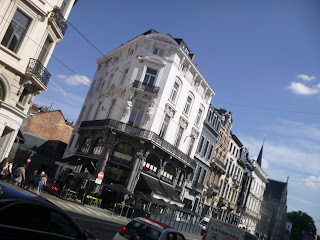
















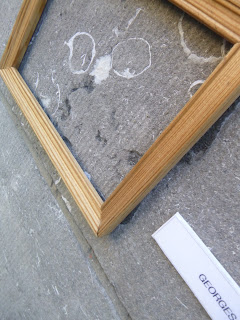














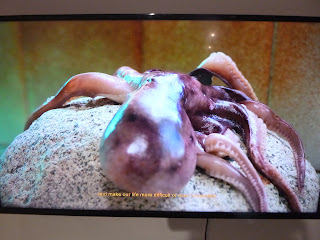






















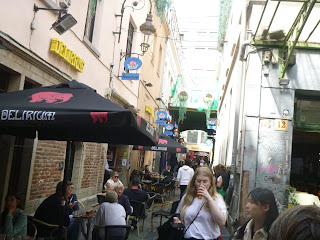





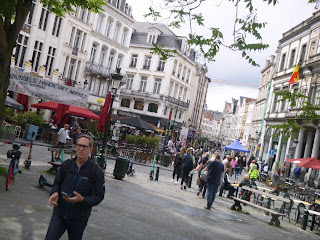






















































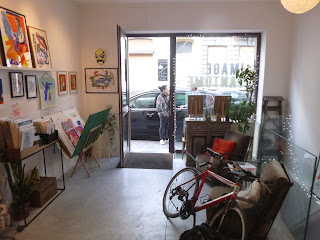














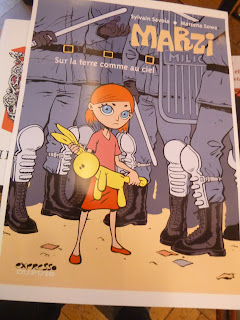


















































































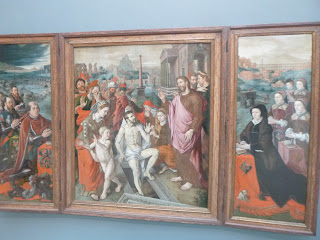























































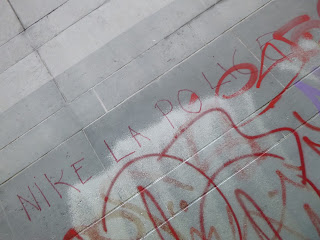


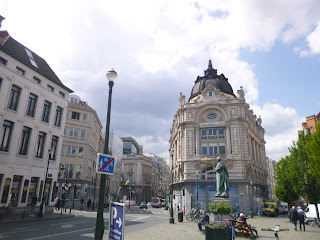
































































No comments:
Post a Comment